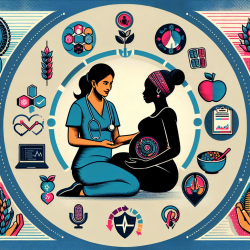Introduction
In the realm of speech-language pathology, understanding the multifaceted influences on child development is crucial. Recent research titled "Mental health symptoms and their relations with dietary diversity and nutritional status among mothers of young children in eastern Democratic Republic of the Congo" sheds light on the intricate relationship between maternal mental health and nutrition. This blog post aims to help practitioners enhance their skills by implementing research outcomes or encouraging further exploration.
Research Highlights
The study investigated the association between mental health symptoms and the diet and nutritional status of mothers in South Kivu, DR Congo. Utilizing data from 828 mothers, the research assessed anxiety, depression, and PTSD symptoms using standardized tools. Interestingly, the study found that severe maternal mental health symptoms were associated with higher dietary diversity scores, although no significant relationship was observed with BMI or underweight status.
Implications for Practitioners
For practitioners in speech-language pathology, these findings underscore the importance of a holistic approach when working with children and their families. Here are some practical ways to apply these insights:
- Holistic Assessment: Consider the mental health and nutritional status of mothers when assessing children's developmental needs. Understanding these factors can provide a more comprehensive view of the child's environment.
- Interdisciplinary Collaboration: Work closely with nutritionists and mental health professionals to address the broader needs of the family, which may indirectly benefit the child's communication development.
- Promote Nutritional Education: Encourage programs that educate mothers on dietary diversity and its potential impact on mental health, which can lead to better outcomes for their children.
Encouraging Further Research
The study highlights the need for more research to understand the underlying factors influencing the relationship between mental health and dietary diversity. Practitioners can contribute by:
- Participating in Research: Engage in or support studies that explore the connections between maternal health and child development.
- Advocating for Funding: Push for resources to be allocated towards research that investigates these critical areas, particularly in low-resource settings.
Conclusion
The intersection of maternal mental health and nutrition presents a unique opportunity for practitioners to enhance their impact on child development. By integrating these insights into practice and advocating for further research, practitioners can contribute to improved outcomes for children and their families.
To read the original research paper, please follow this link: Mental health symptoms and their relations with dietary diversity and nutritional status among mothers of young children in eastern Democratic Republic of the Congo.










